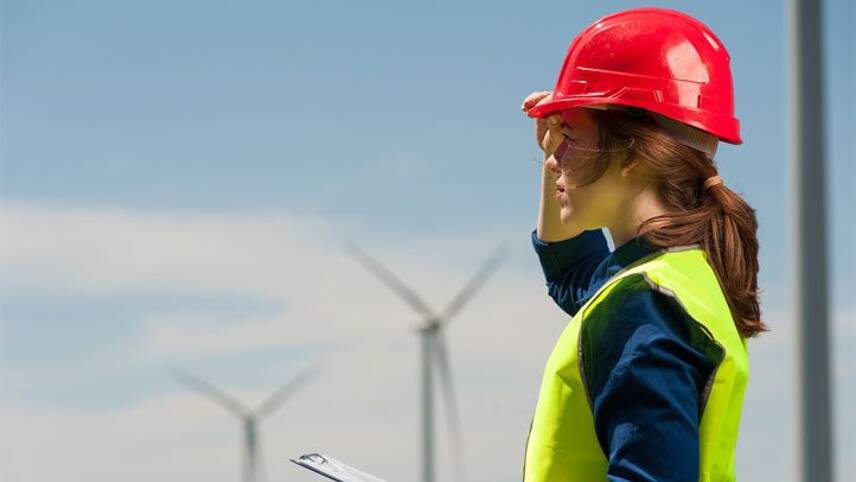Register for free and continue reading
Join our growing army of changemakers and get unlimited access to our premium content

The announcement comes after ScottishPower secured contracts for a host of new green projects
The ‘Big Four’ firm polled 4,000 adults across the UK this summer, asking them about their views on the skills transition that will be needed if the Government is to meet its net-zero target and to deliver a strong economic recovery from Covid-19.The results were published today (22 September).
Building on previous studies which have concluded that lockdown restrictions generally affected the career paths and upskilling opportunities of women more severely than men, the poll found that 23% of women believe they now have less job security than in 2019, compared with 17% of men. This feeling was most pronounced among women aged 18 to 24.
Moreover, 20% of employed mothers said the pandemic has had a negative impact on career progression, compared with 16% of fathers.
When unemployed people were asked whether the pandemic has worsened their access to employment opportunities, 38% of women said yes, compared with 23% of men.
With the UK’s net-zero target and green recovery ambitions in mind, PwC asked the survey respondents about whether they felt supported to enter a green job. The UK Government is notably targeting two million green jobs by 2030, up from around 400,000 at present.
Just one-fifth (20%) of women believe they have the skills they need to work in a green job, compared to almost one-third (31%) of men. Additionally, men generally said they were more aware of green job opportunities than women; only one-fifth (21%) of women reported this awareness.
“We can’t achieve the goal of successfully levelling up the UK if half of the population is at a disadvantage from the outset, regardless of where they live,” PwC’s Government and health industries partner Dan Burke said.
“The pandemic has accelerated what were already rapid changes in the world of work but this revolution should be of benefit to everyone. It’s crucial, therefore, that gender equality is placed at the heart of the green and fair recovery plans and this will mean further interventions from both employers and policy-makers.”
PwC has pointed to several reasons for women feeling less prepared for the ways in which the pandemic and climate crisis have affected the jobs landscape than their male counterparts.
These include a lack of flexible and hybrid working models; poor support on return from maternity leave; unaffordable childcare; poor access to shared parental leave and a lack of targeted careers support for women to access industries that are traditionally male-dominated, such as construction and heavy industrials.
Women also reported to PwC that they received poor careers advice, with much advice now proving outdated with net-zero in mind. Only one-quarter (27%) of the women polled said the advice and services they received in school was helpful.
“With the continuing momentum of the green revolution and the resulting emergence of new industries, policymakers and businesses must work side-by-side in bringing about a level playing field which will allow women to play a leading role in shaping the future,” PwC’s economic and business affairs leader Rachel Taylor said.
The Government’s own Green Jobs Taskforce has been urging Ministers to ensure that the forthcoming Net-Zero Strategy, due ahead of COP26 in November, includes adequate detail and funding for the jobs and skills changes needed to deliver a just transition.
Diversity in Sustainability
The UK Government’s definition of green jobs are those directly relating to low-carbon sectors, such as renewable energy generation, and those in sectors providing solutions that can accelerate the low-carbon transition, such as electric vehicles (EVs).
However, sustainability and energy professionals are not all included in the definition. Moreover, many in this field have argued that to truly embed sustainability, all functions of business will need to become green, including procurement and HR.
The launch of PwC’s report comes a week after the publication of Diversity in Sustainability’s annual survey of 1,500 practicioners across Canada, the US and the UK.
The survey found similar results to that of a past paper from Policy Exchange, which concluded that, while the gender balance in the sector is good, more than 96% of people working in the field are white.
Of the respondents to Diversity in Sustainability’s research, only one-quarter (27%) felt that their leadership teams were diverse. 70% of white women said they worked with other white women, while just 24% of black professionals and 29% of South Asian professionals said they saw someone like them in their networks.
The research also found that white professionals are more likely to feel confident pitching ideas than other ethnic groups, that they are more likely to reach senior positions more rapidly, and more likely to retain their jobs for longer.
Diversity in Sustainability is optimistic that a demographic shift ahead. 54% of sustainability professionals aged 24 or under are people of colour and, among those in junior and middle management roles, women account for more than 50% of professionals.
However, the organisation is calling for more support for barriers to entry to the field – and career advancement – to be removed. Barriers discussed in the report include a lack of access to networking; a lack of access to growth opportunities; a lack of mentorship and role models; legacy hiring; a lack of understanding that minority groups may have poor family support or lack generational wealth and a lack of exposure to green careers at school.
Sarah George


Please login or Register to leave a comment.